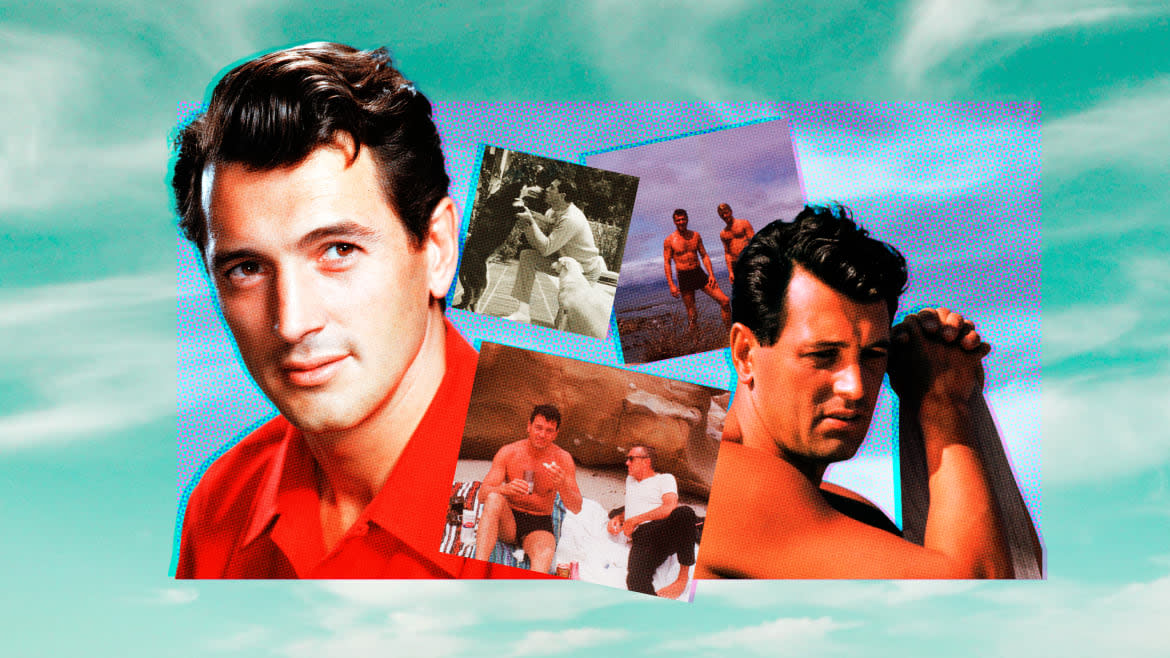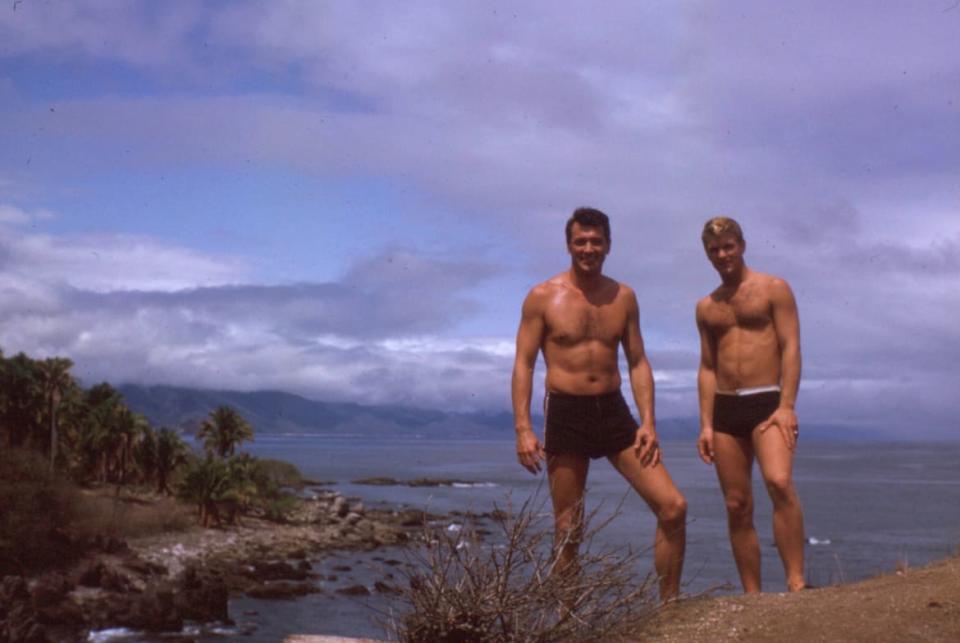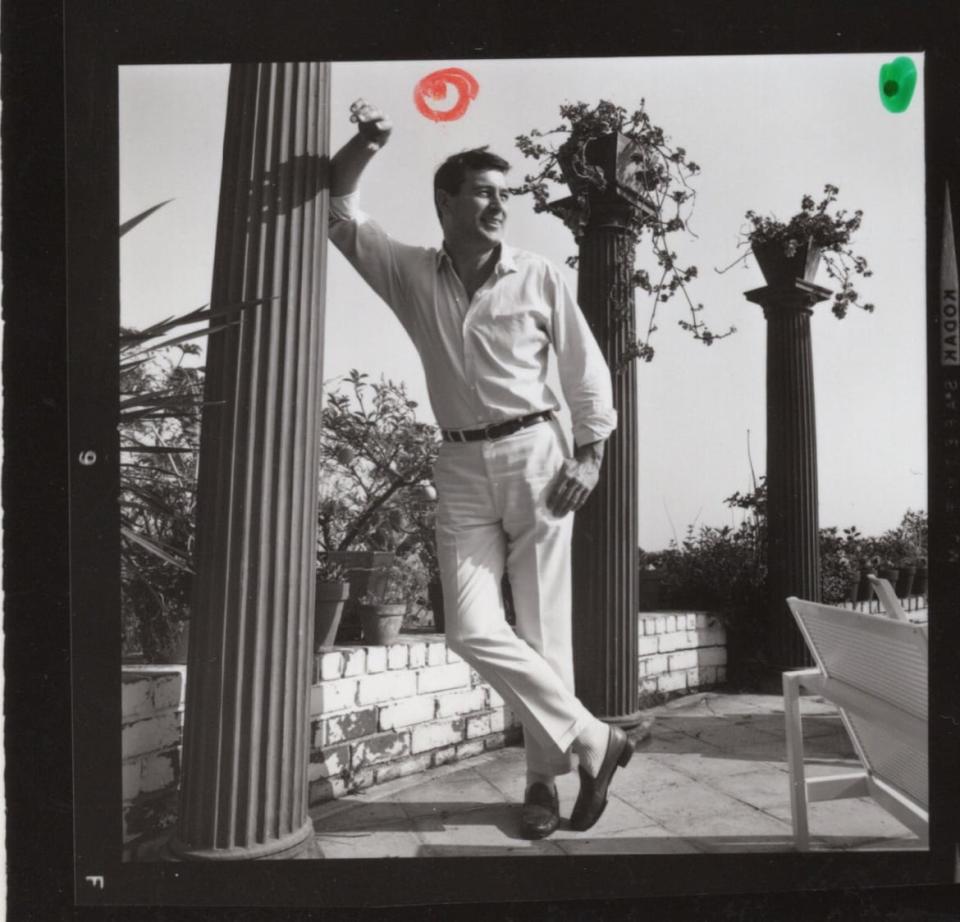Rock Hudson Was Hollywood’s Closeted Gay Star—and He Was Happy

- Oops!Something went wrong.Please try again later.
With his massive 6-foot-5-inch frame, sharp jawline, dark hair and impossibly good looks, Rock Hudson always struck me as someone who would have made an ideal Superman—a notion reinforced by his stout-yet-sensitive all-American screen persona. Of course, Hudson wouldn’t have just looked the part of the Man of Steel; he would have understood a character who had a secret identity, since the Hollywood star himself was a matinee idol who famously lived his entire public life in the closet.
Rock Hudson: All That Heaven Allowed is the story of the two Hudsons, one for the spotlight and one for his friends, lovers and confidants, and perhaps most surprising is that the portrait it presents is not of a tortured soul but of a man, and actor, who was comfortable in all the roles he inhabited.
Director Stephen Kijak’s excellent documentary (premiering June 28 on HBO, following its debut at the Tribeca Film Festival) is, in the end, an inescapably sad one, given that Hudson died of complications from AIDS on Oct. 2, 1985, at the too-young age of 59, thus becoming the first A-list celebrity to fall victim to the epidemic. Nonetheless, if that sorrow hovers over its action, it never overwhelms it.
Nowhere is that more apparent than in its discussion of Hudson’s own attitude toward having to hide his homosexuality from an industry, and fan base, that would not tolerate it. Never confused about his sexuality, Hudson arrived in Hollywood from Winnetka, Illinois (after a WWII stint in the Navy) as a gay man who knew the proverbial score, keeping his personal proclivities behind closed doors, and—with guidance and grooming from agent Henry Willson, who shepherded him and many other queer actors through this beefcake-y era—projecting himself in films as the embodiment of contemporary masculinity.
Rather than taking a conventional talking-head approach to its non-fiction biography, Rock Hudson: All That Heaven Allowed melds varied audio interviews with photographs, text documents, TV and news clips, and footage from Hudson’s films. That material is definitive proof that, among other things, Hudson was one of the 20th century’s handsomest men.
Moreover, he was one of the most magnetically photogenic people to ever stand before a camera, radiating such vibrant charisma that watching any snippet from his oeuvre is to immediately understand why agents, producers and audiences were wowed by him. Hudson is referred to in the film as “the Tom Cruise of his day,” but that’s underselling his beauty—he was like a Midwestern-bred variation of Michelangelo’s David.

Rock Hudson and Lee Garlington in Puerto Vallarta, 1963.
He also wasn’t a bad actor, as Rock Hudson: All That Heaven Allowed proves. Collaborating with editor Claire Didier, director Kijak shrewdly splices together memorable moments from numerous Hudson features, paying special attention to his lasting hits: Douglas Sirk’s Magnificent Obsession and All That Heaven Allows, George Stevens’ Giant, and John Frankenheimer’s Seconds.
Both Sirk and Frankenheimer’s triumphs are stories about individuals whose perfect surfaces mask darker truths about themselves and their environments. Consequently, they continue to resound as fictional tales that parallel Hudson’s real-world circumstances. Kijak furthers such echoes by repeatedly including snippets of movie dialogue that, in one way or another, speaks to the feelings, obstacles and conflicts that Hudson faced while navigating his image-centric Hollywood milieu, where tabloid snooping required arranged marriages, clandestine rendezvous and avoiding being photographed with paramours.
He Slept With Cary Grant and Spencer Tracy—And Changed Hollywood History
Hudson was finally outed in July 1985 courtesy of his AIDS diagnosis—which could no longer be excused as the byproduct of anorexia or food poisoning—and Rock Hudson: All That Heaven Allowed details his final years with poignancy. Director Kijak, however, refuses to define Hudson’s legacy as simply that of a famous talent who was tormented by his inability to exist as a proudly gay man. Far from a cliché, the Hudson depicted here is someone who was well aware of the rules by which he had to play in order to thrive in Hollywood, and accepted them without great anger or agony.
According to the many friends and flames interviewed in the doc, Hudson worked hard to maintain a heterosexual façade for the benefit of his career, but otherwise enjoyed a robust and happy sexual and romantic life, much of it conducted at his Beverly Hills mansion (dubbed “The Castle”), where parties and trysts were a frequent occurrence.

Rock Hudson at his home “The Castle” in the 1960s.
The great revelation of Rock Hudson: All That Heaven Allowed is that Hudson was seemingly at ease with his straddling-two-universes circumstances, and that he did so with aplomb and without great dismay. Tales from the City author Armistead Maupin notes that Hudson was part of a pre-liberation generation that took pride in covering for each other even as they supported the burgeoning movement, and Ken Maley notes that when he took the actor to a gay sex club Hudson was not only an enthusiastic participant but was blithely unperturbed when the partner he was with cried out for the entire establishment to hear, “Oh my God, it’s Rock Hudson!”
There’s joy and humor in Kijak’s film, and it radiates as brilliantly as Hudson’s attractiveness, as when a friend hilariously remarks, "Rock had a sizable dick, but he tried to put that thing up my ass and I couldn't do it!”
Why Gore Vidal Loved Scotty Bowers, Hollywood’s Best-Known Pimp Who Fixed Him Up With Rock Hudson
There’s no escaping Hudson’s fate, though, and Rock Hudson: All That Heaven Allowed concludes with a heart-wrenching recap of his ordeal with AIDS. Guided by narrated passages from his friend George Nadar’s diaries, the documentary touches upon the terror of the time, and the rumors that swirled around Hudson due to his deteriorating appearance—culminating with a guest spot on Dynasty that demanded he kiss co-star Linda Evans, who today rails against the fearful slander and innuendo that ensued. A critique of the Reagan administration is an inevitable component of this chapter, especially considering that Hudson was close with first lady Nancy Reagan.
Director Kijak doesn’t try to sugarcoat the pain that everyone felt about Hudson’s demise, nor does he strain to end things on an optimistic note; even if his death helped raise awareness about the disease, Hudson’s passing was an awful loss. With artistry and honesty, Rock Hudson: All That Heaven Allowed pays tribute to its subject, allowing us to fully see his every side.
Liked this review? Sign up to get our weekly See Skip newsletter every Tuesday and find out what new shows and movies are worth watching, and which aren’t.
Get the Daily Beast's biggest scoops and scandals delivered right to your inbox. Sign up now.
Stay informed and gain unlimited access to the Daily Beast's unmatched reporting. Subscribe now.

